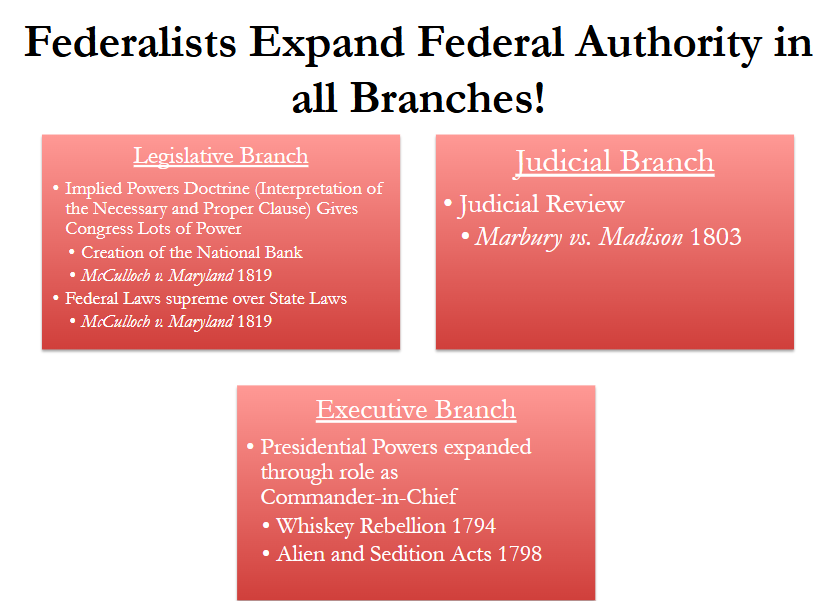2. 1789-1835 Expansion of National Government Under Federalists
1/9
There's no tags or description
Looks like no tags are added yet.
Name | Mastery | Learn | Test | Matching | Spaced |
|---|
No study sessions yet.
10 Terms
Expansion of National Government Under Federalists:
4 instances, making gov bigger
1790: The creation of the First National Bank
1794: The Whiskey Rebellion
1798: Alien and Sedition Acts
Kentucky + Virginia Resolutions
1801-1835: The Marshal Court
1: The creation of the First National Bank
1790 Hamilton proposed the creation of a national (central) bank
Argued that creation was Constitutional under “necessary and proper clause”
Hamilton took liberal reading of Constitution
Before deposits were held in state and private banks
Problems w/ bank:
Constitutionality is in Question: Thomas Jefferson says unconstitutional, Hamilton constitutional
Divides ppl:
Pro Bank= Hamilton is creating plan for major economy (digging grave for slavery)
Anti Bank = Jefferson wants to create plan for farming economy (want slavery)
2: The Whiskey Rebellion
1794, Hamilton proposed excise (luxury) tax on the manufacturing and production of whiskey produced in U.S. to fund American gov and nation out of debt
July 1794: a group of Pennsylvania farmers who opposed the tax destroyed a tax inspector's house (side hustle)
Hamilton knew that rebellion threatened the gov
If ppl violently opposed laws, the national gov would have no power
If rebellion overthrew gov, America would end
Hamilton advocated the use of military force to suppress the rebellion which Washington went along with
13,000 militia troops sent to western Pennsylvania led by Hamilton and Virginia governor Henry Lee
Significance Both Hamilton and Jefferson believed the will of the ppl gives gov power -> but want it in diff ways (popular sovereignty)
To Hamilton: Rebellion proves the strength of the government outweighs the ppl -> proves gov doesn't have tyrannical rule bc the ppl who made this decision = popular sovereignty
To Jefferson: pro-rebellion bc ppl are demanding the right to decide and have the American spirit -> popular sovereignty should be direct to individual
3: Alien and Sedition Acts
1789 John Adams is prez tensions r rising bc French Rev is raging in Frace and US doesnt get involved
Washington/Hamilton didn't get involved French helped out for Americans Rev Jefferson wanted to help out but Hamilton said to expensive
Citizens: Anti-french and anti-John Adams
Congress passed the Alien and Sedition Acts (advised by John Adams) to censor talk abt France and John Adams
Allowed president to imprison or deport foreigners considered “dangerous to the peace and safety of the United States”
Restricted any speech which was critical of the federal government
3.5: Kentucky and Virginia Resolutions
Theory of Nullification → states how power to nullify/invalidate whether law is constitutional or not
Thomas Jefferson + James Madison wrote this in response to AA acts bc the constitution never says who determines what is constitutional and what to do abt it
Now states can rule that smt is wrong and not follow that federal law
Supreme Court: is ruling on other things rn
The Compact Theory of the Constitution: (to Jefferson) const creates a contract among the states (marriage 2 distinct individuals w/ same view, but does not create one person)
(to Abraham Lincon) gov is a separate entity that cant be undone (baby of 2 ppl)
Which justifies the succession during the Civil War
4: The Marshal Court
1801-1835 → Andrew Jackson
Series of 3 significant rulings by John Marshall
John Adams appointed John Marshall as Cheif Justices of SCOTUS
Federalists Party leader and Secretary of State under john Adams
In Supreme Court foreva
Marshal decides to increase the power of the Supreme Court dramatically
(used to meet in the basement of the capital building)
4.1: Marbury v. Madison
1803: Judicial Review-> Regarded as the single most important case in American Constituional Law
Established SCOTUS as the final decider of constitutionality b/c that's what John Marshall said (NOT IN CONSTITUTION -> not decided by individual states)
When North wins Civil War Nullification and Compact Theories r killed and Abraham Lincon idea previals (bc judicial review)
4.2: McCullock v. Maryland pt 2
1819: Implied Powers (necessary + proper) Clause Affirmed
Marshall says THIS IS CONSTITUTIONAL, that Hamilton’s logic that Constituion is stretchy is great and this prevail
4.3: McCullock v. Maryland pt 1
1819: Federal Power Supreme Over State
Marshall says states cannot tax Bank -> confirmed the supremacy of federal law over state law
By 1835
All Branches of Gov have been expanded by Federalists
